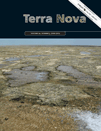
TERRA NOVA
Scope & Guideline
Pioneering Insights into Geology and Beyond
Introduction
Aims and Scopes
- Tectonics and Structural Geology:
The journal emphasizes studies related to tectonic processes, including faulting, folding, and crustal deformation, providing insights into the dynamics of Earth's lithosphere. - Geochronology and Radiometric Dating:
Research involving U-Pb, Ar-Ar, and other radiometric dating methods is a core focus, contributing to understanding the timing and duration of geological events. - Sedimentology and Stratigraphy:
Papers addressing sedimentary processes, depositional environments, and stratigraphic evolution are prevalent, enhancing knowledge of Earth's geological history. - Volcanology and Magmatism:
The journal covers research on volcanic activity, magma formation, and the geochemical processes involved in volcanism, providing insights into the behavior of volcanic systems. - Paleoenvironmental Reconstruction:
Studies that reconstruct past environments using various geological and paleontological methods are a key component, helping to elucidate historical climate and ecological changes. - Geophysical Methods and Modelling:
The application of geophysical techniques to understand subsurface structures and processes is a significant area of interest, bridging field data with theoretical models.
Trending and Emerging
- Advanced Geochronological Techniques:
There is a notable increase in the application of innovative geochronological methods, such as in-situ U-Pb dating, which allow for more precise dating of geological materials and events. - Climate Change and Environmental Impact Studies:
Research linking geological processes with climate change, particularly regarding sedimentary records and paleoenvironmental changes, has gained traction, reflecting a broader interest in understanding human impacts on geological systems. - Geophysical Imaging and Monitoring Techniques:
Emerging themes include the use of advanced geophysical methods, such as seismic tomography and InSAR, to monitor active geological processes and understand subsurface structures in real-time. - Fluid Dynamics in Geological Systems:
Studies investigating the role of fluids in geological processes, such as magmatism and deformation, are increasingly common, indicating a trend toward understanding the interactions between fluids and solid Earth. - Integrated Earth Science Approaches:
Papers that combine multiple disciplines, such as geology, geophysics, and geochemistry, are on the rise, reflecting a shift towards holistic approaches in understanding complex geological phenomena.
Declining or Waning
- Paleontology and Biostratigraphy:
Research related to paleontological studies and biostratigraphic frameworks appears to be diminishing, possibly as the focus shifts towards more geologically driven studies. - Geological Hazards and Risk Assessment:
Though still relevant, papers specifically addressing geological hazards and risk assessments have decreased in frequency, suggesting a potential shift towards more fundamental geological research. - Geomorphology and Landform Studies:
The exploration of landforms and geomorphological processes has become less prominent, indicating a reduced emphasis on landscape evolution in favor of subsurface geological processes.
Similar Journals
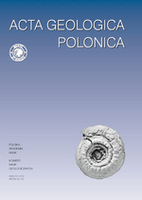
ACTA GEOLOGICA POLONICA
Advancing geological knowledge for a sustainable future.ACTA GEOLOGICA POLONICA is a distinguished journal published by the Polska Akademia Nauk, in collaboration with the University of Warsaw's Geology Department. Since its inception, it has served as a vital platform for disseminating innovative research in the field of Geology, reflecting a commitment to advancing scientific knowledge in Earth and planetary sciences. With an ISSN of 0001-5709 and an E-ISSN of 2300-1887, this journal provides a rigorous review process and is classified in the Q3 quartile for Geology as of 2023, indicating its growing influence in the discipline. Despite not being open access, the journal facilitates meaningful contributions that span a range of geological topics from fundamental research to applied sciences, thereby enriching the academic landscape. Researchers, professionals, and students alike are encouraged to engage with the valuable findings and discussions contained within its pages, which continue to shape the future of geological inquiry.

Swiss Journal of Geosciences
Exploring the Depths of Geoscientific KnowledgeSwiss Journal of Geosciences is a prestigious academic journal dedicated to advancing the field of geosciences, published by SPRINGER INTERNATIONAL PUBLISHING AG. Since its inception in 2007, the journal has established itself as a leading platform for disseminating high-quality research findings in various domains related to Earth and planetary sciences, achieving a notable Q1 ranking in Geology as of 2023. With a solid reputation reflected in its Scopus ranking of Rank #72/321, the journal stands in the 77th percentile within its category. Based in Switzerland, the Swiss Journal of Geosciences embraces an open access model, making it easier for researchers, professionals, and students worldwide to access vital geological research without barriers. The journal’s objectives include promoting interdisciplinary research and fostering insights that address both fundamental and applied geoscientific problems, ensuring it remains a crucial resource for those seeking to understand our planet’s dynamics. Engage with pioneering research and contribute to the vibrant community of geoscientists by exploring the impactful articles published within its pages.

BASIN RESEARCH
Illuminating the Path of Earth and Planetary SciencesBasin Research, published by Wiley, is a leading journal in the field of Geology, with a distinguished reputation affirmed by its Q1 ranking in the 2023 category of Earth and Planetary Sciences. Since its inception in 1988, the journal has been at the forefront of fundamental and applied research surrounding sedimentary basins, delving into their evolution, architecture, and dynamics. With an impressive Scopus rank of #36 out of 321, placing it in the 88th percentile, Basin Research serves as a critical platform for researchers, professionals, and students engaged in advancing our understanding of geological processes and their implications for natural resources and environmental policies. The journal is accessible to a global audience and emphasizes high-quality, peer-reviewed articles that cover a diverse array of topics from basin analysis to sedimentology and beyond. For those interested in deepening their insights into this vital area of study, Basin Research stands as an invaluable resource in the academic landscape.
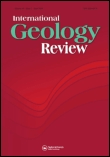
INTERNATIONAL GEOLOGY REVIEW
Fostering a deeper understanding of Earth's processes and materials.INTERNATIONAL GEOLOGY REVIEW, published by Taylor & Francis Inc, is a premier journal dedicated to advancing the field of geology since its inception in 1959. With its Q1 ranking in the field of Geology for 2023, this journal is a significant platform for researchers, professionals, and students exploring the intricacies of Earth and planetary sciences. The journal has been rated in the 81st percentile within Scopus rankings, reflecting its influence and the high quality of articles published. Although it does not offer Open Access options, the journal maintains a rigorous peer-review process to ensure the publication of original and impactful research. With an extensive archive projected to continue until 2024, INTERNATIONAL GEOLOGY REVIEW serves as an essential resource for those seeking to deepen their understanding of geological phenomena, making it a vital contributor to the global scientific community.

STRATIGRAPHY AND GEOLOGICAL CORRELATION
Advancing Geological Insights Through StratigraphySTRATIGRAPHY AND GEOLOGICAL CORRELATION is a prominent scholarly journal published by PLEIADES PUBLISHING INC, featuring a dedicated focus on the fields of geology, stratigraphy, and paleontology. With ISSN 0869-5938 and E-ISSN 1555-6263, this journal has been disseminating significant research findings since its inception in 1994, continuously contributing to the academic discourse through 2024. Despite not currently offering open access, its relevance is underscored by its Category Quartiles for 2023, where it has established itself as Q3 in Geology and Paleontology, and Q2 in Stratigraphy. STRATIGRAPHY AND GEOLOGICAL CORRELATION ranks #29 out of 55 in Stratigraphy and #186 out of 321 in Geology according to Scopus metrics, positioning it within the competitive landscape of Earth and Planetary Sciences. Researchers, professionals, and students are invited to engage with the journal’s content to deepen their understanding and foster innovation within these critical areas of study.
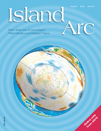
ISLAND ARC
Advancing Knowledge in Earth and Planetary SciencesISLAND ARC is a prestigious journal dedicated to the field of Geology, published by WILEY. With a strong focus on the geology of island arcs and other related research, it serves as a vital resource for scholars, professionals, and students interested in earth and planetary sciences. The journal, which has been in circulation since 1992, is indexed in Scopus and holds a commendable Q2 ranking in its category for 2023, indicating its significant impact within the geological community. The journal’s ISSN is 1038-4871 and its E-ISSN is 1440-1738. Although it does not currently offer open access, it remains a crucial platform for disseminating high-quality research relevant to geological phenomena, promoting interdisciplinary collaborations and advancing our understanding of geological processes. With an address in Hoboken, New Jersey, ISLAND ARC continues to enhance its global influence and scholarly contributions through rigorous peer review and a commitment to excellence.

Journal of Earth Science
Innovating research for a changing planet.Journal of Earth Science, published by the China University of Geosciences, Wuhan, is a leading journal in the field of Earth and Planetary Sciences, recognized for its significant contributions to the understanding of geological processes and environmental challenges. With an impressive Q1 ranking among Earth and Planetary Sciences journals and a strong position at Rank #39/195 in Scopus, this journal not only showcases high-quality research but also serves as a crucial platform for disseminating innovative findings, spanning a broad spectrum of topics from geophysics to climate change. The journal adopts an open access model, which enhances the visibility and accessibility of research articles published from 2009 to 2024, thereby facilitating collaboration and knowledge sharing among the global scientific community. With its commitment to advancing geosciences, Journal of Earth Science is invaluable for researchers, professionals, and students alike, eager to stay informed and contribute to ongoing discussions in this dynamic field.
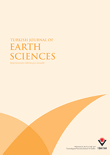
TURKISH JOURNAL OF EARTH SCIENCES
Catalyzing Scholarly Discourse in Earth SciencesTURKISH JOURNAL OF EARTH SCIENCES, published by the Tubitak Scientific & Technological Research Council Turkey, is a premier platform dedicated to advancing the field of Earth and Planetary Sciences. With an ISSN of 1300-0985, this journal has been a significant contributor to the international scientific community since its inception in 2002, and is set to continue publishing groundbreaking research through 2024. As a recognized journal in the Q2 quartile of Earth and Planetary Sciences, it ranks #98 out of 195 in its category according to Scopus metrics, positioning it within the 50th percentile of its field. The journal emphasizes peer-reviewed research, providing invaluable insights that facilitate scholarly discourse and promote rigorous investigation into various aspects of the Earth sciences. Although it does not currently offer open access, the journal remains a vital resource for academics, professionals, and students seeking to deepen their understanding of geological phenomena and contribute to the advancement of this essential discipline.

GEOLOGICAL QUARTERLY
Fostering Scientific Collaboration in Geology.GEOLOGICAL QUARTERLY, published by the Polish Geological Institute, is a respected journal in the field of geology, offering insights into Earth and planetary sciences since its inception in 2000. With an ISSN of 1641-7291 and an E-ISSN of 2082-5099, this journal serves as a vital platform for researchers, professionals, and students seeking to expand their knowledge in geological disciplines. The journal is positioned in Q3 within the geology category as of 2023 and ranks #172 out of 321 in Scopus, placing it in the 46th percentile among its peers. Although currently not an open-access publication, GEOLOGICAL QUARTERLY reflects the policy of fostering scientific communication and collaboration by disseminating valuable geological research. Its commitment to publishing original articles, reviews, and technical notes ensures that it plays a significant role in advancing geological science and its applications within the academic community. With its base in Warsaw, Poland, the journal stands as an important resource for anyone engaged in or studying the Earth sciences.
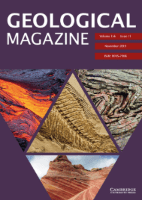
GEOLOGICAL MAGAZINE
Illuminating the Past, Present, and Future of GeologyGEOLOGICAL MAGAZINE, published by Cambridge University Press, is a premier journal in the field of geology, renowned for its rich legacy since 1864 and ongoing contributions to Earth and Planetary Sciences. With an impressive Q1 ranking in Geology and a Scopus rank of #70 out of 321 journals, it holds a significant position within the academic community, appealing to researchers, professionals, and students alike. The journal covers a wide array of topics, ensuring a comprehensive platform for the dissemination of cutting-edge geological research. Although it does not offer open access, it remains a vital resource for those seeking to stay abreast of advancements in the field. With an enduring commitment to quality, GEOLOGICAL MAGAZINE stands as an essential outlet for scholarly communication and serves as a catalyst for academic discourse within the geological sciences.